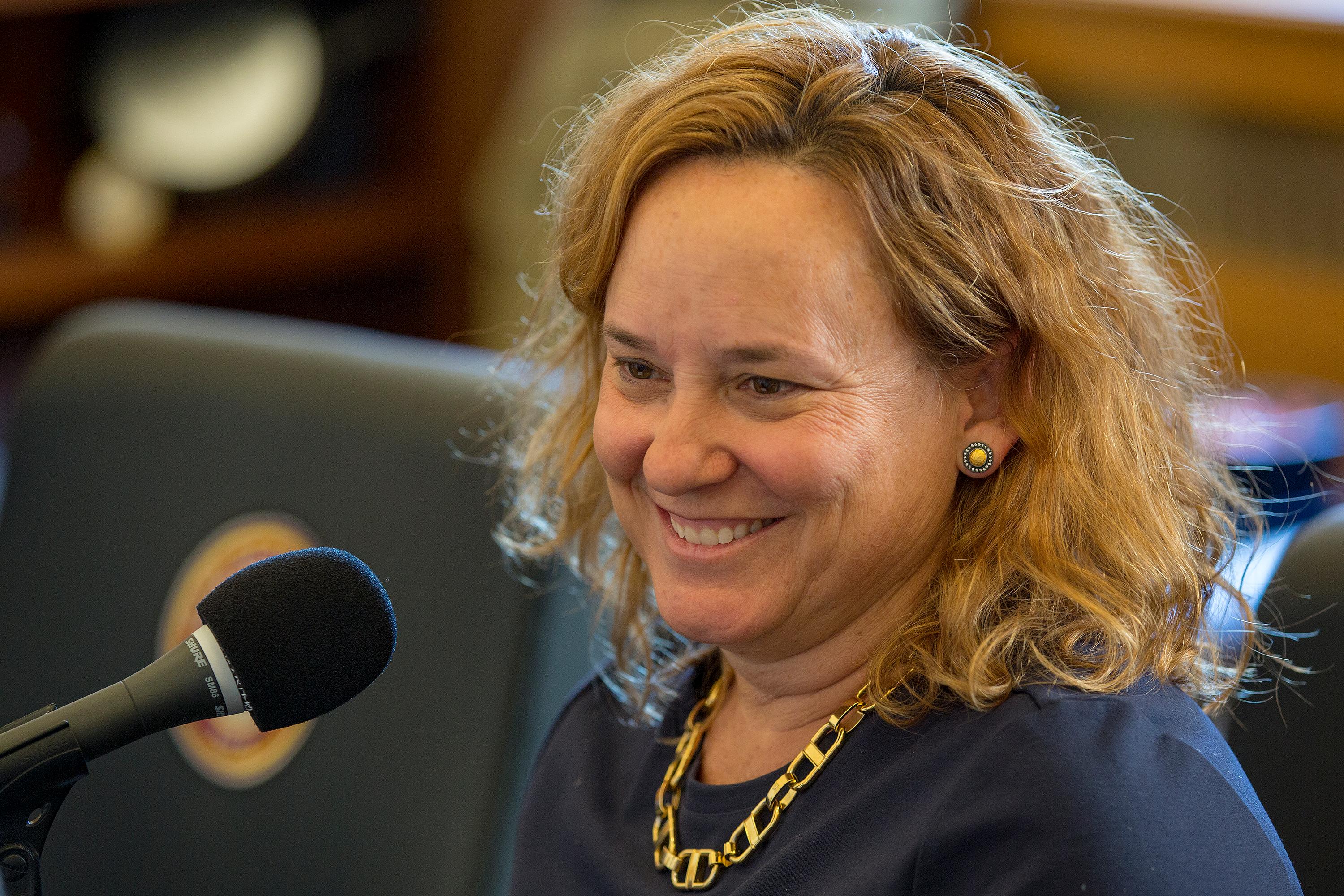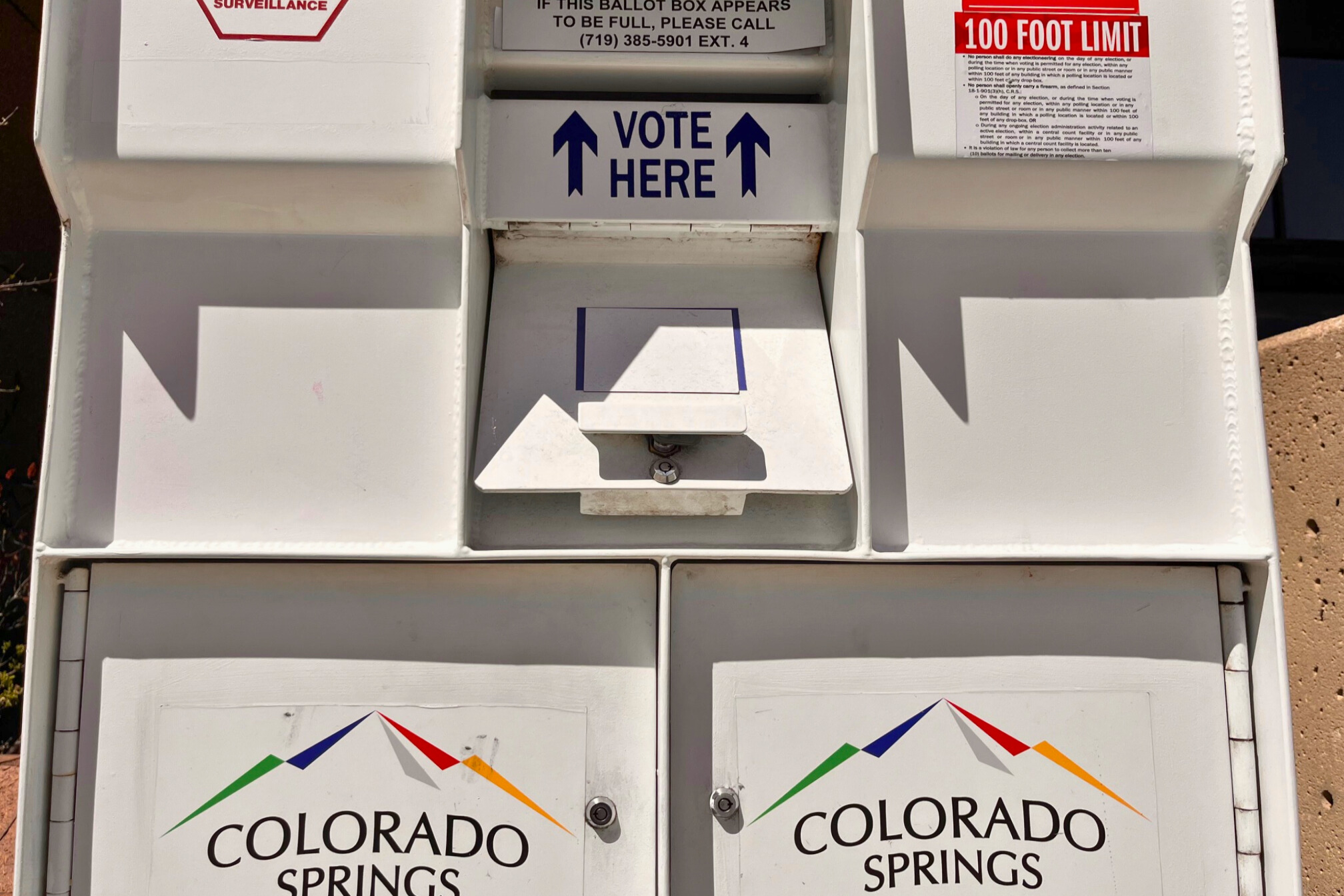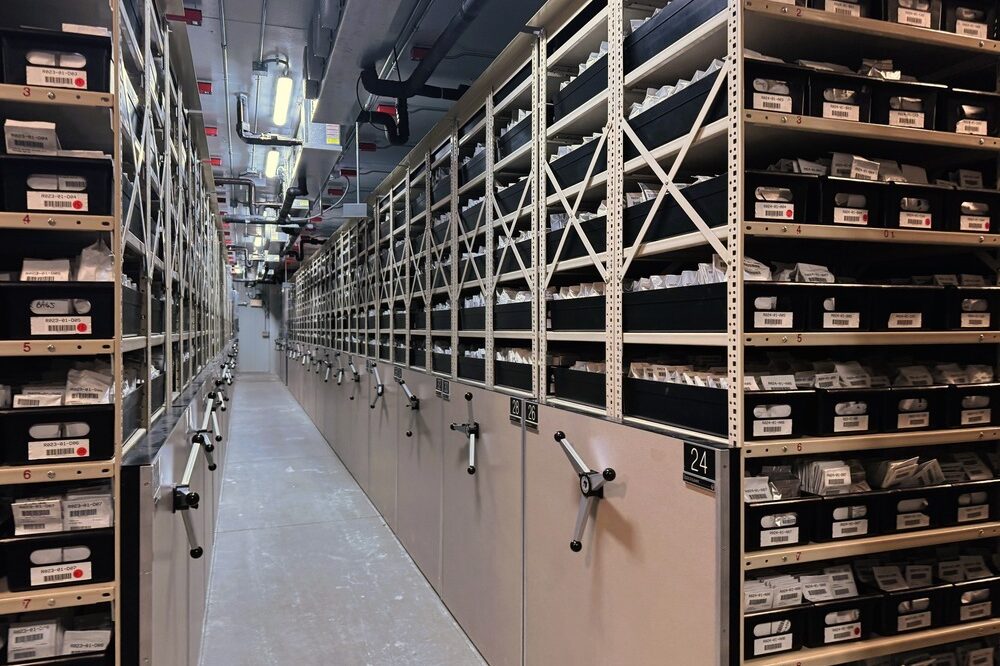

Colorado voters gave Democrats total control of the state government. So... what will they get for it? How ambitious will Democrats in the legislature be when it comes to gun control, hydraulic fracturing, and money for schools? And what room is there for Republicans?
Incoming Democratic Speaker of the House KC Becker of Boulder and Republican Senate Minority Leader Chris Holbert of Douglas County shared their thinking on the 2019 session with Colorado Matters. With the majority in the House and Senate, and perhaps backstopped by Gov.-elect Jared Polis, another Democrat, Becker said a cooperative path on new laws would be nice — but not essential.
"If we can get bipartisan support on any legislation we would welcome that, but it's not going to stop us from enacting good policy," Becker said.

Holbert, 15 year veteran of the statehouse, acknowledged there are a couple of ways he and other Republicans might react to the Democrats' agenda.
"The statesman in me says, 'no, we don't want (Democratic) overreach,'" Holbert said. "The political leader in me, 'yes, would I take advantage of that if it were presented to me?' I would have to."
Interview Highlights
Holbert on where voters are after the midterms:
"...clearly voters, especially unaffiliated voters, went Democrat in 2018. But what I tell Republicans is take some hope. Voters did side generally with our views on taxation, Proposition 112, the role of oil and gas industry setbacks. The voters voted fairly conservatively or Republican-like on the issue side of the ballot."
On the chances a Red Flag law to allow the temporary removal of a firearm from an at-risk person passes:
Becker: "We have the numbers to pass it and we think it's good policy."
Holbert: "The opposition is not necessarily centered on the subject matter of that bill or the wording of that bill. It is the wording of the 4th Amendment of the United States Constitution. And that wisely restrains the power of government to search you, your person."
On how the Democrat majority will handle oil and gas regulation this session:
Becker: "I think it's definitely time to pass new oil and gas laws, to change the mission of COGCC [Colorado Oil and Gas Commission, the state regulator] to make sure that health and safety is absolutely part of their analysis in determining whether to approve a permit."
Holbert: "People have cared about clean air and water for generations here. This is not a new conversation. I think it's also fascinating to consider that once again in an election in Colorado, we've seen voters go different directions. We have Gov.-elect Jared Polis, who will take office, I believe, Tuesday, the 8th, and a majority of the voters said he is their choice for governor. And the majority of voters said no to [Proposition] 112 [a law to expand the distance between oil and gas and homes and buildings]."
On where things stand with sexual harassment as the legislative session begins:
Becker: "I think we want to keep thinking about how to deal with complaints, how can we deal with them in a timely way. Are the complaints going to the right people? What if they're anonymous? And then how do you ultimately deal with changing the culture of the capitol. Essentially this place is all about the exercise of power and influence and we want to make sure that sexual harassment is never a factor in that."
Holbert: "Where we fell down, where we failed was when they were asked [in the legislature's workplace study] do you feel confident, are you confident if something bad happens and you file a complaint, then we saw that's where the negative opinion was and truly, it is complicated and that's being addressed in a bipartisan way and I think we're going to see positive improvement. We already have and I think that we will see a conclusion of that fairly early in the session.
Read The Transcript:
Ryan Warner: Welcome both of you to the program. Incoming Speaker of the House KC Becker: Thanks for having us. Incoming Senate Minority Leader Chris Holbert: Thank you. RW: The Democrats head into this session with total control-the House, the Senate, the Governorship. That hasn't been the case since 2014. Speaker, do you read that as a mandate and if so, what is your mandate this session? KB: I think voters were rejecting the cruelty and chaos of Washington. I think they were also aligning themselves with Democratic policies. We're really focusing on advancing the Colorado way of life, reducing healthcare costs, making sure we have an economy that works for all and I think those messages resonated with voters. RW: Healthcare costs, certainly something the governor campaigned on and has set as a priority for his administration, that is Gov.-elect Polis. You talk about the Colorado way of life. It sounds like an ad for tourism. What does that mean to you? How does that guide you as Speaker? KB: I think that really gets to Colorado values around environment and the outdoors. You know, a lot of people from all over the country move here, start their businesses here, start their families here because of those environmental values. So I think a part of it is environment. RW: Okay, we'll dig into the healthcare and environmental policies in just a bit. But I wonder what you might tell despairing Republicans, Sen. Holbert, heading into this session who think my goodness there's no back stop on the Democrats? CH: Well first we look back to the election and clearly voters, especially unaffiliated voters, went Democrat in 2018. But what I tell Republicans is take some hope. Voters did side generally with our views on taxation, Proposition 112, the role of oil and gas industry setbacks. The voters voted fairly conservatively or Republican-like on the issue side of the ballot. We do recognize they went the other direction when they chose candidates. RW: Let's go back to healthcare. State Rep. Dylan Roberts and Sen. Kerry Donovan, they're both Democrats who represent mountain communities along I-70, plan to introduce a pair of bills on the first day of session that would direct the state to create a public health insurance option. Speaker, are you on board with that and why or why not? KB: I think we're going to see a whole variety of bills introduced to address healthcare costs. I think- RW: Which are especially high in the mountains. KB: Which are especially high in the mountains. I represent part of that area as well and it's incredible and the state really hasn't been able to do anything to address it. So I think there's going to be a variety of proposals ranging from more transparency in billing, transparency in pharmaceuticals, how insurance prices things, but they're going to be proposals like a re-insurance program that would- RW: Sort of redistributes risk. KB: That's exactly right. RW: What about the public option? KB: We're going to have a discussion about it. I think the... RW: It doesn't sound like you're committed to it. KB: I want to see where the House and Senate are. What we know now is that things aren't working the way they are and we have to have changes. RW: You say that you tend to lean towards a public option. Why is that? KB: Well I think it holds promise for reducing healthcare costs for people, making healthcare generally more accessible. RW: That is in markets where there might be a very few number of plans offered, a very few insurers, there would always be this one insurer, a sort of guarantee of that. KB: That's right. CH: I would lean against a public option. I don't think it's the appropriate role for government to compete with the private sector but I expect that the health insurance companies are probably all scratching their heads and wondering how they might respond to this, short of actually having a public sector option. So it will be interesting to see how those private companies might respond in hopes of addressing the high cost of insurance especially in mountain and west communities. Maybe there's some way that we can resolve those issues without government actually competing with the private sector. KB: You know, government provides Medicare, government provides Medicaid. They are essential programs for a huge number of people so as a fundamental concept is that a problem? No. RW: Okay, so last year Republicans blocked a so-called Red Flag Gun Bill which would have allowed judges to seize firearms from people deemed a risk to themselves or others and this session a freshman State Rep. Tom Sullivan, who lost his son in the Aurora theater shooting, told us that he'd be the lead sponsor on what's also known as a Gun Violence Restraining Order bill. This is interesting. He is not leading on this because he thinks it would have necessarily saved his son's life. Tom Sullivan (via tape): I'm not quite sure that this bill would have had anything to do with preventing what happened to Alex and the other eleven people that were murdered in the theater that day. RW: You actually think of this as a bill that combats suicide as much as it does externalized violence. TS (via tape): We had over 800 deaths last year in the state of Colorado by firearm. Over 600 of those were suicides. RW: Speaker, is this destined to become law now? KB: I think this is the year to pass the Red Flag bill. RW: Do you have the numbers? KB: We have the numbers to pass it and we think it's good policy. CH: The opposition is not necessarily centered on the subject matter of that bill or the wording of that bill. It is the wording of the 4th Amendment of the United States Constitution. And that wisely restrains the power of government to search you, your person. RW: It's not the Amendment I thought you were going to point to on this one, I have to be honest. CH: No, it isn't. Our view, at least my view, is I'm very much interested in what changes do we need to make for law enforcement or the courts to help a person who is demonstrating concerning behavior? Making threats. Deputy Parrish was killed in the district that I represent. RW: In Douglas County. CH: So, this is important to me. My older son is a Deputy Sheriff in Douglas County. This is important to me. But even members of law enforcement say wait a minute, what about the 4th Amendment? RW: OK, when we talk about guns, the elephant in the room is the session during which Democrats were in control of both chambers, they passed-after the Aurora theater shooting-a package of gun restrictions including universal background checks and limits on magazines. Following that session, there were recall elections and it was largely seen as a response to Democratic overreach. Democrats lost their majority in one chamber. Is there a risk of that happening again? Do you have that in your mind, Speaker, and think we've got to mind our p's and q's? KB: Well we have to mind our p's and q's. I think that it is likely that no matter what we do some people are going to scream overreach because they're not going to like it. There's a lot that was passed in 2013 that people yelled overreach about and now, today, are saying that actually turned out to be really good policy. RW: Universal background checks have broad support in polls. KB: Absolutely. RW: I would say that the magazine limits are perhaps perceived as less successful. A lot of law enforcement just don't know how to enact them. KB: Yeah, you know, but that's one example of when there was a cry of overreach. Another example is when we passed a 10 percent renewable energy standard for rural electric associations and some counties said they were going to secede from the state over that. In fact, so many of those rural electric associations today are saying our energy provider isn't moving to renewable energy fast enough. So that was just five and a half years ago. And when people screamed overreach and are now saying we actually want to go a lot farther, people- RW: I think what I hear you saying is that there may be cries of overreach but eventually you'll come to love it. KB: Well, I think, you know, hindsight is 20/20 but people screamed overreach about civil unions. And one year later the U.S. Supreme Court said there's actually a constitutional right to gay marriage. You know- RW: So back to that idea of minding your p's and q's, what does that mean practically as a legislator? KB: I think we want to push good policy, do broad stakeholder work. RW: Do you want as many Republican votes on things as possible? Is that a goal of yours? KB: I think to-if we can get bipartisan support for any legislation, we welcome that. But it's not going to stop us from enacting good policy. You know, we aren't going to require that there be one Republican vote on every bill or anything like that. We're going to work towards getting bipartisan support but not to the extent that we think we compromise the underlying goal of what we want to achieve. RW: Is part of the Republican strategy simply to sit back and hope that Democrats overreach? CH: Yes and no. The statesman in me says no, we don't want overreach, we want to govern with an even hand. The political leader in me-yes, would I take advantage of that if it was presented to me? I would have to but I don't control that. I have to see what is presented to me. Where I find hope is that Sen. Leroy Garcia from Pueblo will take that gavel and lead the Democrat caucus as president of the Senate. The reason that gives me hope is that Sen. Garcia represents one of the districts where recall occurred. And he was here in the House, I believe he voted no on the Mag Ban bill and he has put his name on bills twice that I have run to repeal that. If anyone in the Senate knows where that line is of overreach, I think it's Leroy Garcia. RW: Okay, oil and gas. Another perennial issue facing the legislature. Colorado Rising, which was the group behind Prop 112 on the last ballot and which failed, they have said that they will gather at the capitol the first day of the session to demand a moratorium on new drilling until a state-sponsored health assessment is completed. Speaker, is a moratorium appropriate? KB: Well I think it's definitely time to pass new oil and gas laws, to change the mission of COGCC to make sure that health and safety is absolutely part of their analysis in determining whether to approve a permit. And I think also giving communities greater say. RW: COGCC is the Colorado Oil and Gas Conservation Commission, something of the governing state body for this. KB: Yeah. RW: It sounds like you think that that agency for lack of a better term, is on the industry's side. Is that what I hear you saying? KB: Yeah, and I think the statutes might be currently written to make them that way. RW: Will there be a bill to change its mission? KB: Potentially. I think that's going to be part of it. I think, you know, health and safety concerns, air quality, water quality, are really top of mind for a lot of people. You know, you don't have to be living next to, you know, an oil well to be impacted by the air quality. I don't think people are actually paying attention — I know COGCC hasn't been — to how bad things have gotten. So, that's something we really have to address. RW: And to this moratorium idea, too extreme? KB: Well, you know, that is really going to be up to the governor. I think there's a legal question about whether the legislature- RW: Could flex that muscle? KB: Can pass a moratorium but I think it's absolutely reasonable to say that, you know, there's a huge number of permits that have been issued recently and people were concerned-oil and gas was concerned-that 112 would pass and they thought if they got their applications in quicker, maybe they'd be grandfathered. I do not want COGCC rushing through any of that and I absolutely want us to be able to pass a bill that gives health and safety a primary consideration in siting. RW: Chris, you also represent people who hold these mineral rights and for whom access to those rights is a matter of their livelihood, of their economic security. What might you add, Senator? CH: Well I think it's important that we keep perspective. This is not a beginning point of oil and gas. It's already heavily regulated. Some would say that we are the most regulated or have the best set of regulations here in Colorado. People have cared about clean air and water for generations here. This is not a new conversation. I think it's also fascinating to consider that once again in an election in Colorado, we've seen voters go different directions. We have Gov.-elect Jared Polis, who will take office, I believe, Tuesday, the 8th, and a majority of the voters said he is their choice for governor. And the majority of voters said no to 112. I think one of the things that was fascinating and powerful during the campaign for and against Proposition 112- RW: Which would have increased setbacks, by the way, between oil and gas and homes, other sort of sensitive areas, big occupied buildings. CH: The number of people I saw at the grocery store, out and about with their kids, parents with their kids, wearing the I Am Oil and Gas t-shirts and having those conversations with their neighbors; people, again, in the produce aisle of the grocery store. And for us to be reminded that this isn't just some monolithic industry that takes resources out of the ground but as you mentioned, people own those rights, own that property, private property landowners, not just big corporations. And there are many thousands of people in Colorado who make their living from taking oil and gas from the ground and turning it into energy. As long as we do that in a responsible way, it is clean and I share concerns over safety, then that industry should continue. A moratorium? No, I don't support that. RW: Over my right shoulder there's a sign. It says Harassment Free Office. This office is committed to a work environment free of unlawful harassment. When you are here, you can expect to work in safety and dignity. I have to think that this sign went up in part because the legislature itself has dealt with questions of sexual harassment and just last month, two state senators resigned, Democrat Daniel Kagan and Republic Randy Baumgardner. There was a lot of talk about potential changes to be made here at the Capitol. How sexual misconduct is reported. How to better protect staffers, interns, in an environment where there are some very powerful people. Just briefly, where do things stand going into a new session? KB: Well, you know, we made a few steps last year and I think they were good ones, Mandatory Workplace Harassment training every year. We've hired a Human Resources director to help work through some of these issues. I think we want to keep thinking about how to deal with complaints, how can we deal with them in a timely way. Are the complaints going to the right people? What if they're anonymous? And then how do you ultimately deal with changing the culture of the capitol. Essentially this place is all about the exercise of power and influence and we want to make sure that sexual harassment is never a factor in that. RW: It sounds like you're raising a lot of questions. You don't have a lot of answers to them yet. CH: Well I think it's important that we look back to the Workplace Culture study that was conducted last year. It was fascinating to see that — and reassuring for me — I've worked here both outside the glass and now inside the glass for 15 years, starting my 16th session around the capitol and I feel very safe. I encourage people to come here- RW: You're a dude. CH: Well that's true but 85 percent, 90 percent, I think the high was 93 percent when asked questions of do you feel safe here, would you encourage a family member or friend to come work here, very high percent of people say yes. Where we fell down, where we failed was when they were asked do you feel confident, are you confident if something bad happens and you file a complaint, then we saw that's where the negative opinion was and truly, it is complicated and that's being addressed in a bipartisan way and I think we're going to see positive improvement. We already have and I think that we will see a conclusion of that fairly early in the session. RW: Okay, there's so many issues we don't have time, at least in this conversation to get to. I think of education funding, I think of roads and transit funding. I think of the fact that sports betting may be coming to Colorado. In part, the legislature will have to take some steps to make that happen. So let me just ask broadly, when you pass a budget, what will it say? I think it was Bill Ritter, the former governor, who used to say that a budget is a moral document. What will the budget say about where Colorado wants to put its money? KB: We are going to absolutely prioritize funding for education. But I think to the extent we can use the budget to advance other goals like renewable energy or addressing climate change, we're going to use it in that way as well. RW: Above roads, would you say? KB: Well I think funding roads is absolutely an ongoing issue and is going to continue to be top of mind for the legislature. My caucus continues to believe that we need new funding, that we can't, you know, squeeze enough out of the current budget to meet our existing priorities but also address the $9 billion backlog so we are going to continue to look for new funding sources but we have struck deals in the last two years to put significant general fund money into transportation. We've been chipping away at it through the general fund. I just don't think that that's the long-term solution. RW: Thanks to both of you for being with us. KB: Thank you for having us. CH: Yes, absolutely. Thanks for the opportunity. |









